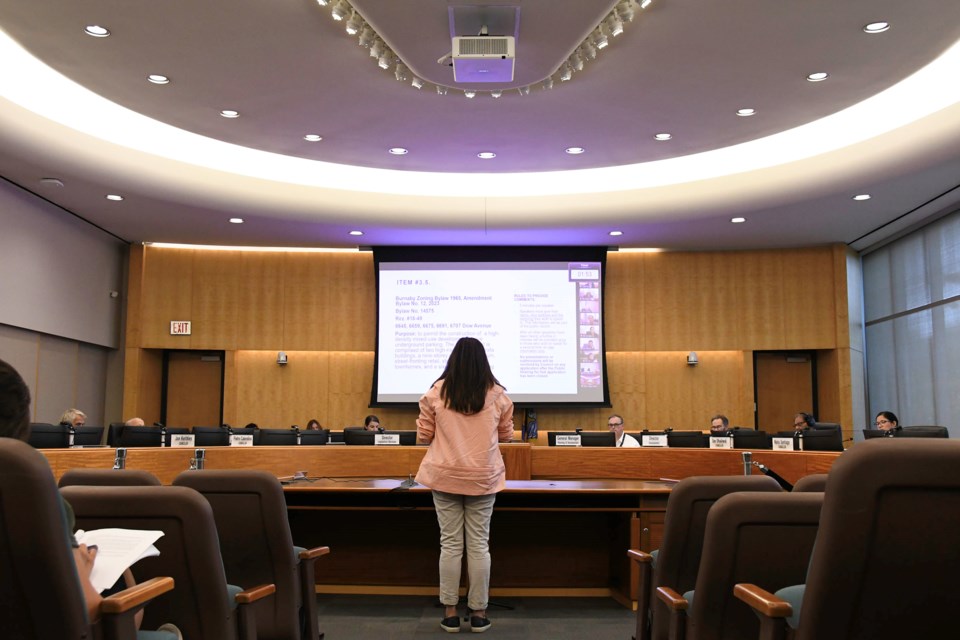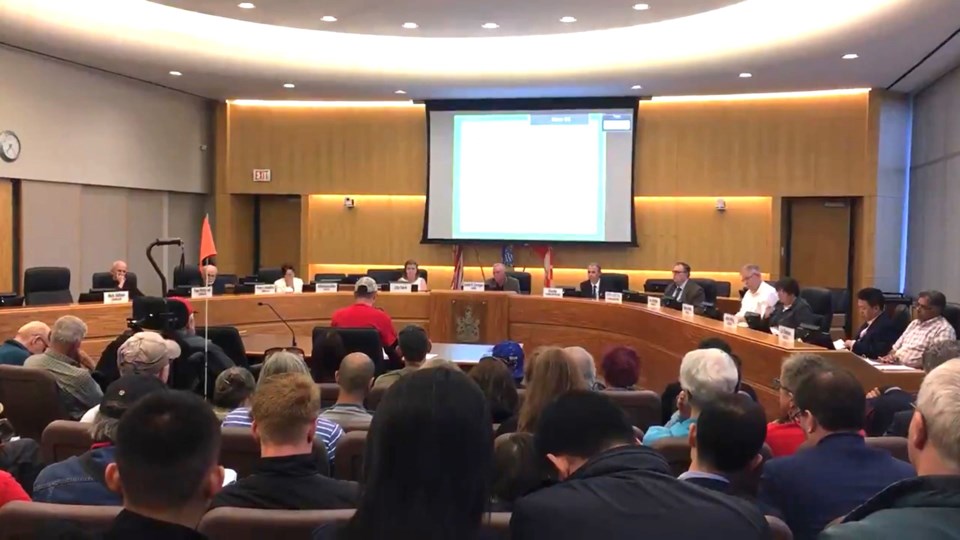Burnaby will nix about 90 per cent of its public hearings for new developments because the province has “forbidden” them.
The new legislation from the NDP government “prohibits” local governments from holding public hearings for most new developments, according to a city staff report.
The city won’t hold public hearings for new developments going through a zoning change if they’re entirely or “predominantly” (more than 50 per cent) residential and are consistent with the city’s Official Community Plan.
The OCP is a crucial city planning document that lays out what kind of buildings can be developed in which parts of the city.
City staff also recommended cancelling public hearings for non-residential developments that align with the OCP, including for industrial, commercial and institutional uses, beyond just residential development.
When introducing the legislation in November, the provincial government said public hearings create lengthy delays and add costs to housing projects that “in many cases” are already supported by the OCP.
Burnaby’s staff report noted the city’s current OCP provides “a sufficient framework” so most of the rezoning applications that go to public hearing are consistent with the OCP.
The report said about 90 per cent of rezoning applications will now not require a public hearing, which will reduce the number to about 10 per year.

'Undemocratic' or chance for more voices?
Mayor and council expressed mixed opinions on scrapping the hearings at a meeting Dec. 11, though they all unanimously voted to put an end to public hearings for most residential and non-residential developments.
Independent Mayor Mike Hurley stressed the decision was put upon the city by the province.
“We’re forbidden from having public hearings,” Hurley said.
“I just want to be very clear on that, because it’s not our call.”
Green Party Coun. Joe Keithley had strong words in opposition.
“It seems to be very undemocratic to me,” Keithley said.
“The public has a right to say: this is their one chance to speak out about stuff. … I just think this is the wrong way to go at this.”
But councillors from the NDP-aligned Burnaby Citizens Association were not opposed.
BCA Coun. Maita Santiago said it’s a “good time” to revisit how the city gets public input, noting that public hearings don’t always include the opinion of the whole community.
“There’s also been a concern that the public hearings weren’t really able to capture all of the voices of people that wanted to contribute, you know, just because there are different barriers with regard to who can attend public hearings, who feels comfortable speaking at a public hearing.”
BCA Coun. Sav Dhaliwal said the provincial changes will require cities “to really focus” on the OCP.
He said once a city commits to an OCP, that will be “the assurance” to the public and developers to know what will be built in which areas.
Ed Kozak, the city’s general manager of planning and development, said the city intends to have a “robust consultation” with the public for both the OCP and various neighbourhood plans that become part of the city’s land use.
What’s happened at Burnaby public hearings in the past?
Dhaliwal said public hearings weren’t “something that the council dreamed up.”
“It was obviously a requirement from the province before and subjected everyone to the hearing. We had to go through a very rigid rigmarole to remind people and whatnot. It wasn’t always easy on, particularly, the applicants.”
“Applicants” are the developers applying for a rezoning.
But Dhaliwal noted that in the last 15 years or so, since Burnaby “really picked up” on development in town centres, the city hasn’t rejected development due to opposition at public hearings.
He said he didn’t recall “NIMBYism” (“not-in-my-backyard-ism”) leading to the city turning down applications.
“We certainly didn’t turn any applications down. … But it did take a lot more work.”
He suggested there might be pushback from the public but said the OCP wouldn’t change too much from before.
Other advocacy groups have expressed opposition to cancelling public hearings on social media.
Renters advocate Murray Martin of BC ACORN noted public hearings were a “central organizing tool” used to oppose demovictions in Metrotown.
Disgraced Mayor Corrigan could only have dreamed of stopping public hearings. Public Hearings were the central organizing tool that @BC_ACORN used to fight demovictions. Thanks to @BCNDPCaucus looks like occupation of politicians offices will be best method to fight demovictions
— Murray Martin (@murmar0) December 12, 2023
What’s next?
Any rezoning applications that have not already gone through “first reading” by council will no longer go to a public hearing, according to city staff.
First reading is the first of four major rezoning approvals council grants to applicants.
The first development that will not need to go to a public hearing is the BC Tel Boot redevelopment, which plans for more than 2,500 homes (including around 975 rentals).
Notifications for the rezoning will be sent out as before to property owners within 30 metres of a property being rezoned and through the city’s website and newsletter, to allow the public to provide written comments to staff and council before the first reading.
The city will now only hold public hearings for:
- OCP bylaws and amendments
- Zoning bylaws that are not consistent with the OCP
- Phased development agreement bylaws
- Bylaws for the early termination of land use contracts
- Bylaws for heritage revitalization agreements and designation of heritage properties






